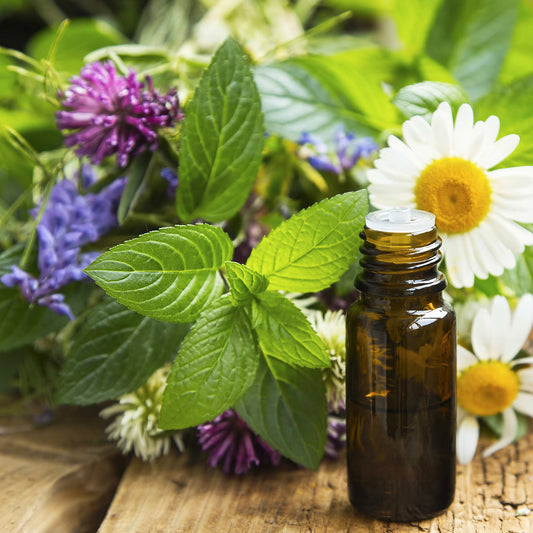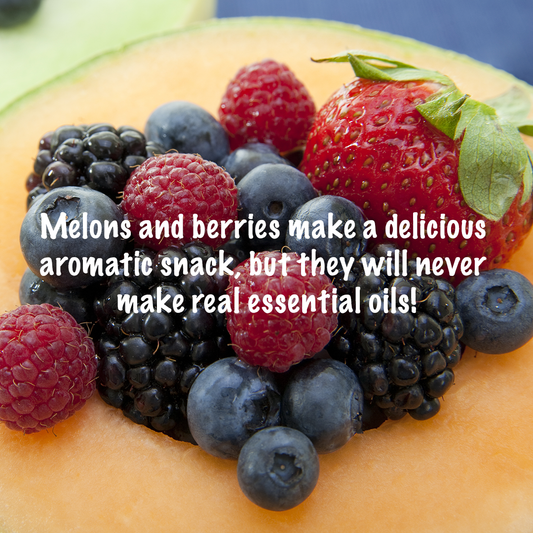Why Do the Scents of Essential Oils Change or Decrease in Natural Soap?
My new soap bar doesn't smell the same as the last one!
 We sometimes receive emails that go like this:
We sometimes receive emails that go like this:
- I just reordered [some soap]. It is my favorite bar but it does not smell the same. Did you change the recipe?
- The soap bar says it has more lemon than lavender but I only smell the lavender.
- The name of this bar is "lavender . . . " but I smell more of the other essential oils than lavender. Why do you call it lavender?
The good news is that when you purchase natural soap from an organic skincare company, it is scented with only pure essential oils.
The bad news is that when you purchase natural soap from an organic skincare company, it is scented with only pure essential oil.
Any of you who regularly follow our blog, know that I have written numerous blogs about pure essential oils (I will place the links to those blogs and the end).
Why Do the Scents of Essential Oils Change?
The scent of a pure essential oil in any totally natural product can and will change over time and from batch to batch.
Essential Oils are a Natural Ingredient
Essential oils come from nature. Essential oils come from plants. The quality and scent of essential oils are affected by yearly weather conditions and vary from crop to crop and region to region.
This makes it very difficult to produce finished products in which the scents are always exactly the same.
 Most commercial soaps (and skincare products), even the more "natural" ones that contain some essential oils, are made with at least some synthetic fragrance oils.
Most commercial soaps (and skincare products), even the more "natural" ones that contain some essential oils, are made with at least some synthetic fragrance oils.
Why? Because using synthetic fragrance oils ensures a more consistent scent.
Unrefined Oils and Butters
We use virgin oils and butters whenever possible. Since virgin oils and butters are unrefined they often have a scent of their own which can affect the scent of the final product.
The natural scent of these unrefined ingredients can also vary from one batch to another.
This is why many personal care companies choose refined or even ultra-refined ingredients.
Why Scents Change in Cold Processed Soapmaking
Essential oils are temperamental to work under any circumstance. But while a natural essential oil scent blend may change a bit in a cream or oil, these blends are especially unpredictable when making cold processed natural soap.
After all my years of soapmaking it never ceases to amaze me just how much the actual soapmaking process changes the scent of an essential oil blend.
Temperature
The method we use to make our soaps is called "cold process" because we add no external heat, during the process of soapmaking. However, that does not mean that the "soap batter" stays cool. The soapmaking reaction (saponification) is what chemists call an exothermic chemical reaction. Exothermic describes a reaction that releases heat to its surroundings.
As the lye water is added to the oils and butters the soapmaking reaction, called saponification, begins. As saponification continues in the soap molds the soap batter can heat up to over 200° F or higher.
Some essential oils like, thyme, clove and cinnamon can cause an even greater increase in soap batter temperature. Some natural additives like honey and goat's milk will also cause an increase in the reaction temperature.
Synthetic fragrances can often be heated to very high temperatures without losing any scent. However, many pure essential oils are greatly affected by these changes in temperature.
Some Essential Oils are Changed During Saponification
According to Dr. Kevin Dunn a professor of Chemical Physics,
"Essential oils are complex mixtures of dozens of chemical compounds. A given essential oil may contain some compounds that react with alkali, and others that do not. Lavender oil, for example, contains about 42% linalool (which does not react) and 22% linalyl acetate (which does). In fact, when linalyl acetate reacts with alkali, one of the products is linalool. Thus the scent of a CP soap made with lavender oil will smell less of linalyl acetate and more of linalool than the original EO."
 Thus, some essential oils contain components that interact in the chemical process of soapmaking which means that they are actually changed during saponification.
Thus, some essential oils contain components that interact in the chemical process of soapmaking which means that they are actually changed during saponification.
As a result, the natural aroma of these essential oils will be altered a bit.
Essential oils like bergamot, clary sage, lavender, petitgrain, thyme, and ylang ylang may be chemically changed during saponification.
Since the scent of some essential oils is changed during saponification, do the beneficial properties of essential oils remain after saponification?
Since the therapeutic properties of essential oils have not been widely accepted by the scientific or the medical communities, there seem to be no studies that directly compare the therapeutic properties of soap without essential oils to the same soap with essential oils.
According to Robert Tisserand, "There is plenty of anecdotal evidence that essential oils in soap are active." The changes that occur during saponification...
"...may or may not result in an alteration of therapeutic properties. That depends on which properties you are measuring and also on which constituents you are talking about, so there isn’t a simple answer. Except perhaps to say that in MOST instances essential oils do in fact retain their therapeutic action!"
Evaporation
In soapmaking, evaporation is our most difficult problem when looking at scent retention. Essential oils are quite volatile. The word volatile comes from the Latin word "volare" which means "to fly," since they quickly evaporate into the air even at room temperature.
Have you ever used an essential blend on your skin and noticed that it has a different scent a few hours later? That's because each of the essential oils in the blend evaporates at different rates.
In 1857 a man named G.W. Septimus Piesse, who owned a luxury perfumery in London, published a book entitled, "The Art of Perfumery." He believed that a balanced essential oil blend was like a beautiful musical harmony and classified the scents of essential oils into "notes," top, middle, and base.
 The “note” of an essential oil is determined by how quickly the scent of the essential oil fades after being openly exposed to air.
The “note” of an essential oil is determined by how quickly the scent of the essential oil fades after being openly exposed to air.
Top Note oils begin to evaporate very quickly, usually within 1-2 hours. They tend to have a light, fresh and uplifting scent. Top notes usually provide the first scent your nose will pick up when smelling an essential oil blend or perfume.
The scents of Middle Note oils are not immediately obvious and it may take a couple of minutes for your nose to recognize them. These warm, soft scents evaporate within 2-4 hours.
Base Note oils are usually heavy, intense, rich oils (think patchouli) that take the longest time -- some can take several days to evaporate! Their scent is easy to smell but it can change over time.
The type of "note" does not indicate whether an essential oil has a strong or weak scent, but a top note oil will have a more immediate impact on your sense of smell since it evaporates more quickly--you usually smell it first.
Essential Oil Note Classification
Although many essential oils fall nicely into one category or another, the classification of some oils varies quite a bit. I have seen some essential oils, such as nutmeg, described as top, middle, and base notes in different sources.
Since the chemical profile of essential oils is very complex and can contain hundreds of individual constituents, within one individual oil there may be top, middle and base notes.
Citrus oils are top notes. I used to make two soaps called "Orange Creamsicle" and "Chocolate Orange Twist." I absolutely loved these soaps and their deep natural orange scent.
Unfortunately, since essential oils will continue to evaporate as the soap cures. When you consider that we allow our soaps to cure for 8 to 10 weeks, the bar often had little scent once we began selling it.
Although once the outer layers of the bar were washed away the delicious orange aroma was there, customers want to smell orange when they opened the box.
Summary
There is often a problem with scent consistency when using pure essential oils, especially in natural cold process soap:
- some essential oils are chemically altered during the saponification reaction
- many essential oils evaporate quickly during and after the soapmaking process
- each essential oil evaporates at a different rate
- citrus oils can be especially short-lived in soap
- the scent of a pure essential oil is affected by weather and varies from crop to crop and region to region
- quite often the scent of a bar of natural soap in which the essential oil blend has faded is revived when you use the bar and the outer layers are washed away
 We spend months creating a beautiful essential oil scent blend and add it to a soap recipe. The scent in the finished bars is a bit different, but we like it and six months later the scent is still nice and strong.
We spend months creating a beautiful essential oil scent blend and add it to a soap recipe. The scent in the finished bars is a bit different, but we like it and six months later the scent is still nice and strong.
Unfortunately, when we reorder our essential oils for this same recipe it is a different time of year and a new crop.
This time the blend smells great before and after the soap is made, but three months later one of the notes in the blend has faded and the exact same soap now has a different scent.
What makes the process so difficult is that we literally do not know for months after the soap has been made whether something has changed, it is quite frustrating.
Although we work tirelessly to maintain consistency and limit the number of variables in our soapmaking process, since our soaps are handmade we will never be able to control everything as well as a machine.
As I said at the beginning of this blog, the good news is that when you purchase soap from an organic skincare company, it is scented with only pure essential oils.
The bad news is that when you purchase soap from an organic skincare company, it is scented with only pure essential oil.
At Chagrin Valley Soap we know that skincare products are only as good as the ingredients used to create them.
It does not make sense to create natural, handmade products with synthetic fragrance oils that offer nothing but scent and chemicals!
So we will stick with our incredibly beautiful, although incredibly finicky, pure essential oils.

Browse Our Full Range of Essential Oils and Organic Soap Bars
The Shelf Life, Color & Scent Of An All Natural Soap
Why We Use Only Real Plant Essential Oils?
Why Are Synthetic Fragrance Oils So Popular?
How We Make Natural Soap At Chagrin Valley


